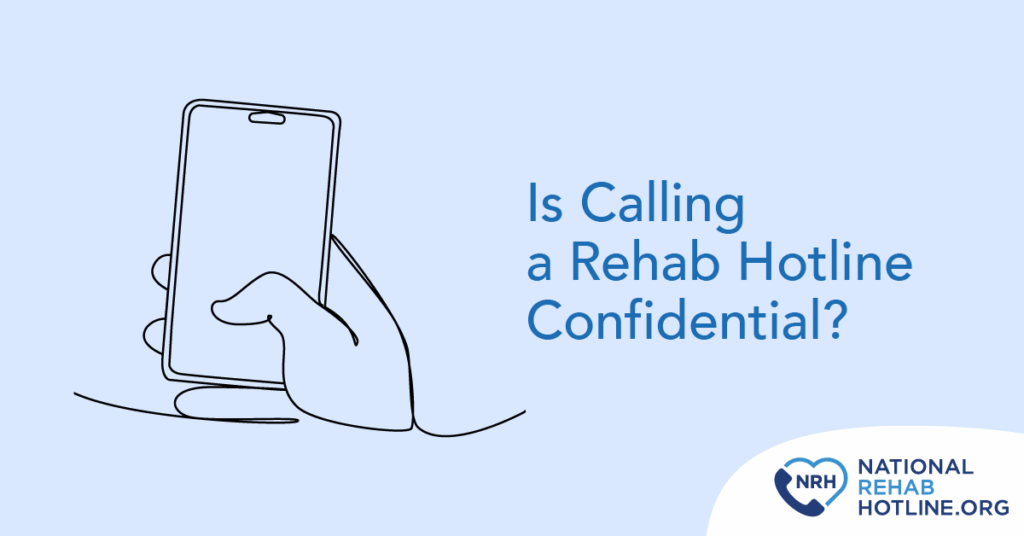A confidential crisis hotline can be a powerful tool throughout your addiction recovery journey, especially when you’re dealing with stress, mental health challenges or cravings. In one review that analyzed over two dozen studies, researchers found that access to hotlines improves treatment engagement and retention for people overcoming addiction.
When you call the National Rehab Hotline, the content of your call stays between you and the specialist. This private, judgment-free space lets you speak openly about what you’re experiencing and receive guidance, resources or simply a listening ear.
Read on to learn about the degree of privacy you can expect from confidential drug hotlines.
What Happens When You Call a Rehab Hotline
Calling a confidential crisis hotline connects you directly to a trained crisis hotline specialist. During the call, they may ask you general questions about your age, your history with substance use and where you live. You don’t have to answer these questions, but any information you provide gives the specialist important context and can help them provide guidance and support.
Calling the hotline doesn’t mean you’re required to enter treatment. However, the specialist can help you understand your options for detox, rehab and recovery support. If you prefer, you can remain anonymous and avoid sharing identifying information or contact details.
Confidentiality and Your Legal Rights
Rehab hotlines affiliated with licensed health care providers operate under strict privacy laws, including HIPAA. This means they aren’t allowed to share your information with third parties, whether that’s your family members, your employer, insurance companies or law enforcement (unless there’s a legal exception).
Your call isn’t monitored or recorded for sales purposes, and you can decline to answer any questions or even end the call whenever you want. Even if you tell the hotline specialist you’re using illegal substances, services remain confidential. These legal protections help ensure your privacy is respected, making it easier to ask for help, explore treatment options or talk through what you’re experiencing without fear of exposure.
What Information Is (and Isn’t) Collected
To provide individualized support, the hotline specialist may ask questions about your substance use, mental health and treatment progress and goals. While these questions help them better understand your needs and offer personalized support or resources, answering is always optional. You aren’t required to share your name, contact information or insurance details unless you want help exploring treatment options.
The specialist will never ask you to provide financial information. If you choose to remain anonymous, the call won’t be traced and your identity remains protected. The purpose of the hotline is to offer help, not collect personal information. This puts you in control of what you share, when you share it and what happens after the call.
How Rehab Centers Protect Your Privacy
Licensed rehab centers take your privacy seriously, using secure systems and strict protocols to protect any information you choose to share. Staff members and hotline specialists go through training in confidentiality practices, and they only access your personal information when necessary.
If you decide to pursue treatment, your records are stored securely, and they’re only shared with your written permission. In most cases, centers use encrypted communication and comply with federal confidentiality regulations such as 42 CFR Part 2, which applies specifically to addiction treatment. These safeguards ensure your information remains protected from security breaches, third-party access and unauthorized disclosures.
When Confidentiality Might Be Limited
While you can trust confidential drug hotlines to keep your personal information safe, there are a couple of instances in which it does get reported when you call a hotline. If you express a clear intent to harm yourself or someone else, staff are legally required to intervene and share relevant information with local law enforcement.
Crises that may result in harm or loss of life are a standard exception across all confidential crisis hotline services. This exception exists to protect life, not to penalize or report the person in crisis. Outside of these instances, all other details remain private.
Why Confidential Crisis Hotlines Encourage People to Seek Help
Confidential drug hotlines play a vital role in helping individuals access the services and support they need to take the next steps in their recovery journeys. Because callers understand their information is private, even if they’re using illegal substances, they have the confidence to speak openly. Hotlines also remove the pressure for immediate action, helping the individual understand their options without having to make a commitment.
The National Rehab Hotline provides confidential support 24-7 through trained specialists, providing a listening ear and helping callers connect with the right resources. For immediate assistance, call the hotline at 866-210-1303.

